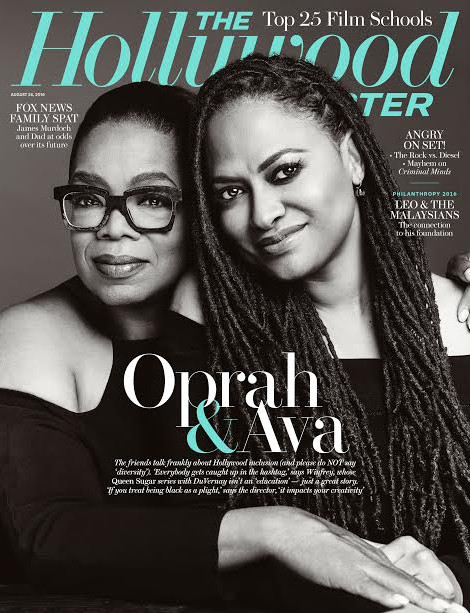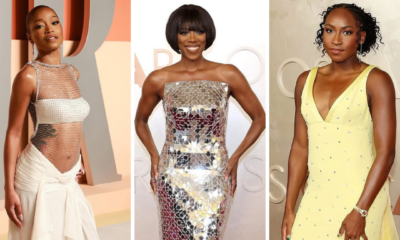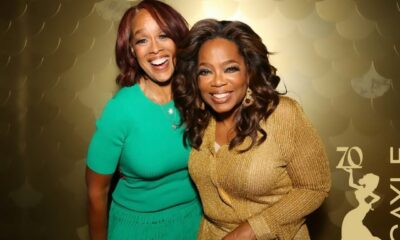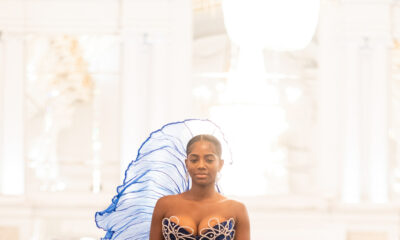Scoop
“If you treat being black as a plight…it impacts your creativity” – Power Women Oprah Winfrey & Ava DuVernay cover the Hollywood Reporter
 Oprah Winfrey and Ava DuVernay cover this week’s issue of The Hollywood Reporter and talk frankly about Hollywood inclusion (and please do not say ‘diversity’). “Everybody gets caught up in the hashtag,” says Winfrey, whose Queen Sugar series with DuVernay isn’t an ‘education’ – just a great story. “If you treat being black as a plight,” says the director, “it impacts your creativity.”
Oprah Winfrey and Ava DuVernay cover this week’s issue of The Hollywood Reporter and talk frankly about Hollywood inclusion (and please do not say ‘diversity’). “Everybody gets caught up in the hashtag,” says Winfrey, whose Queen Sugar series with DuVernay isn’t an ‘education’ – just a great story. “If you treat being black as a plight,” says the director, “it impacts your creativity.”
You can read the full feature via THR website | See excerpts below;
Ava, you’ve expressed strong distaste for the term “diversity,” but Oprah has made use of it. How do you both characterize the concept now in terms of the overall conversation in the industry?
DUVERNAY: We aren’t sitting around talking about diversity, just like we aren’t sitting around talking about being black or being women. We’re just being that.
WINFREY: I will say that I stand corrected. I used to use the word “diversity” all the time. “We want more diverse stories, more diverse characters …” Now I really eliminated it from my vocabulary because I’ve learned from her that the word that most articulates what we’re looking for is what we want to be: included. It’s to have a seat at the table where the decisions are being made.
DUVERNAY: That was your take on it.
WINFREY: When Sidney Poitier came to my school [in South Africa], he gave a gift of 550 movies to the girls. He thought if you watch these 550 movies, they’ll be your education for life. He wrote to the girls that his dream for them was to be able to sit at the table of the future where the world’s decisions would be made. I realize now that what he was saying is to be included, to be valued as a person who has something to contribute.
As black artists, what responsibility do you feel to include the challenges facing the black community in your storytelling?
DUVERNAY: You see integration of Black Lives Matter from the beginning of [Queen Sugar] because it is literally black lives having meaning and mattering in the everyday. With the Black Lives Matter movement, a lot of the focus is on the protest and dissent. I’m hoping to dismantle the public notion — for folks outside of the community — of what Black Lives Matter means. It’s really about saying that black lives matter, that humanity is the same when you go inside people’s homes.
It is presented in policing and imprisonment, too.
DUVERNAY: There are integrations in terms of the police aggression, echoes of prison and the formerly incarcerated. That is also part of the movement that we try to handle in a way that feels elegant and not hitting you over the head like, “Let’s do the rally scene!”
WINFREY: Everybody gets caught up in the slogan and the hashtag and the protest. What we’re trying to do is get you to feel it. You get to feel it when Ralph Angel [Kofi Siriboe] is putting his son to bed, laying with him and reading a story. Intimacy and connection between a father and son? We’ve just not seen it [with black characters on series TV].
And you think we’ve not seen those scenes because the writers often are white?
DUVERNAY: Yeah, they render it through their lens, so you will see that scene, and it will be with white people. All lives can’t matter to folks who are not us if you don’t know us, if you don’t understand [us]. I don’t make anything as education for anyone; I make it as a love letter to the characters: These are black people; this is a black family. It’s a window into that. The same way when I go see A Separation, an Iranian film about an Iranian family, or when I go to see a Korean film, it is a window into that world, and I see them, and I start to understand and value them. They begin to matter to me.
WINFREY: In the early years of The Oprah Winfrey Show, I was doing an episode about single parenting. I had a black father on, and we had gone to his house and done a taped piece about him putting his two little girls to bed and reading to them. This was around 1989 to 1990, before email, and the white audience wrote letters saying, “I didn’t know black men did that.” That struck a nerve. Then I realized that the best way to show that black people are just like everybody else, or that gay people are just like everybody else, is not to do a show about gay people or black fathers raising their children [but] just to include them in a story about raising children. That’s how you normalize it and make it OK for everybody else.
Can black stories accurately be told by people who aren’t black?
DUVERNAY: Artists should be free to create what we want. I believe there’s a special value in work that is a reflection of oneself as opposed to interpretation. When I see a film or a TV show about black people not written by someone who’s black, it’s an interpretation of that life.
WINFREY: I think it depends upon your level of experience.






















